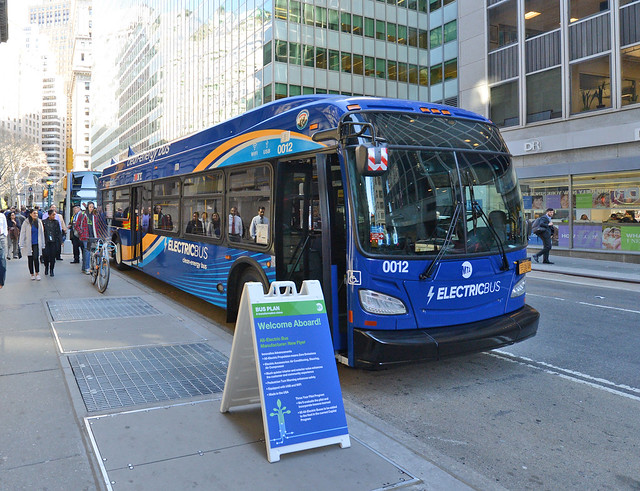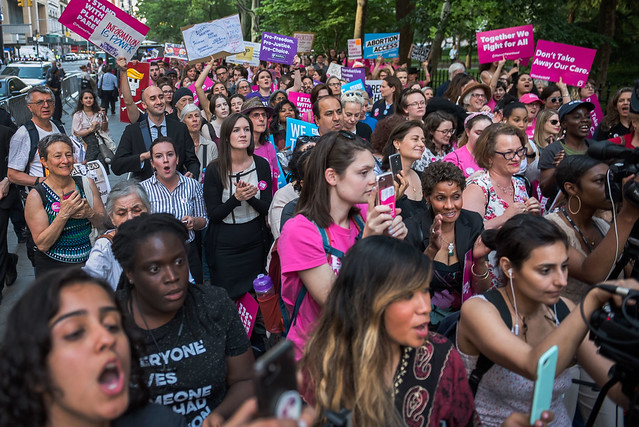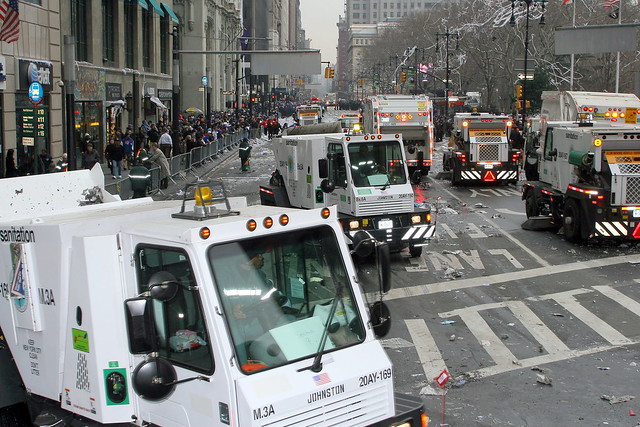Slowing Down 14th Street Bus Plan is Anything But Progress, or Progressive

(photo: Marc A. Hermann/MTA New York City Transit)
One of the most frustrating things about local New York City politics is that many people who believe in progressive ideas on the national stage do an about-face when it comes to progressive change on the local level, often when that change might actually touch their day-to-day lives in some way.
This phenomenon has been captured perfectly by the current debate around the 14th Street busway -- a pilot program approved by the mayor, which would prioritize public transit and trucks over private cars on one of the city’s busiest corridors -- and the troubling last-minute temporary restraining order against its implementation.
Just about everyone talks about how we need to make transit better for working New Yorkers, and that moving New Yorkers by bus, train, and bikes is more efficient and environmentally-friendly than by car, and yet, progress has been ground to a halt in the name of “environmentalism” by a few local residents using their connections and resources to jam up a groundbreaking transit project.
The lawsuit that led to the restraining order comes from a few wealthy, car-driving “progressive” West Side residents who claim that the 14th Street bus plan, as well as the protected bike lanes on 12th and 13th streets, should be subject to an environmental review. (Funny, the car lanes and free parking weren’t subject to an environmental review.)
The cynicism being displayed here by some of my West Side neighbors is far from universal. In fact, support for a busway on 14th Street in our community is overwhelming.
Community Board 6 Manhattan, of which I am a member, represents 147,000 New Yorkers on the East Side, covers half of the 14th Street corridor, and has been on the record supporting bus priority for almost a year. We first voted in favor last September, and then just reiterated our support in a second resolution in February.
Our position has been informed by the testimony of dozens of people at multiple meetings, including meetings hosted by us, by the city Department of Transportation, by the Metropolitan Transportation Authority (MTA), by our elected officials, and others.
Our support for bus priority on 14th Street is informed by our own experience. Because there’s no area north-south subway east of Union Square, we depend on MTA buses more than people in other parts of Manhattan. We rely on the M15-SBS almost like a subway. We use existing upgraded crosstown bus service like the M23-SBS and M34-SBS to connect to the subway system. And we absolutely depend on 14th Street bus service, which (as everyone knows) is unreliable even after recent MTA upgrades.
In our neighborhood, we need and we deserve world-class transportation, and the transit and truck priority corridor the DOT planned would give it to us. It was planning to launch last month — until West Side attorney Arthur Schwartz, who is leading the lawsuit, somehow convinced a judge to put it on hold.
It’s rich to have Schwartz attack the busway with the baseless claim that the community is united in opposition to it. I am here to tell you that that claim is false; the support of Community Board 6 is emphatic and broad-based and it’s on the record. It shouldn’t surprise us that this same attorney has been cluelessly quoted that he doesn’t take the bus when he’s in a hurry.
But some New Yorkers don’t have much of a choice; people like me and 27,000 of our neighbors ride the M14A -- the city's slowest bus -- and M14D every day. Collectively we've lost out on about a year's worth of time while our buses idle in mixed traffic. Our voices matter.
The benefits of faster and more reliable bus service disproportionately accrue to people with lower incomes (that’s the definition of progressive). That reality isn’t lost on most of us invested in the fight to improve transportation in New York City, and we aren’t going to let people like Schwartz wear a mantle that he hasn’t earned, no matter how much they like to call themselves progressive.
I hope the baselessness of this lawsuit is exposed at Tuesday’s hearing where a New York State Supreme Court judge will hear arguments on both sides. I’m optimistic we can get the busway back on track as soon as possible. It will be a game-changer for tens of thousands of working New Yorkers, saving us thousands of hours a year otherwise sitting in traffic or standing in the rain. That’s a progressive step forward that everyone should support.
***
Rich Mintz is a member of Manhattan Community Board 6. On Twitter @richmintz.
***
Have an op-ed idea or submission for Gotham Gazette? Email This email address is being protected from spambots. You need JavaScript enabled to view it.
A Threat to the Right to Abortion Anywhere is a Threat to Abortion Everywhere

(photo: Ed Reed/Mayor's Office)
The fight for safe, legal abortion started long before Roe v. Wade legalized abortion care. Planned Parenthood of New York City and all Planned Parenthood affiliates will always stand in solidarity to protect safe, legal abortion. That has not, and will never change. However, we live in a country where health care is deeply politicized -- because politicians have made it that way, even here in New York.
Abortion is health care, and health care is a fundamental human right. Let me be clear, the same politicians who seek to outlaw abortion are also the same politicians who are forcing dying patients off their insurance by dismantling the Affordable Care Act. They are the same politicians who are lobbied by big pharma in order to triple the cost of insulin. They are the same politicians who want to allow insurance companies to deny coverage to people with pre-existing conditions. These politicians continue to pull the levers of power in favor of themselves, and not the people they represent. These are the types of political barriers our patients and health care professionals face every day.
In May, I stood before a crowd of nearly a thousand New Yorkers, who were enraged over the extreme abortion bans sweeping our country. New Yorkers are fortunate to live in a state where the protections of Roe v. Wade were recently enshrined into state law, but New Yorkers are also savvy enough to know that an attack on abortion in any state, is an attack on abortion in every state.
I echoed the true New York City spirit - If you mess with one of us, you mess with all of us - that evening at a “Stop the Bans” rally in Lower Manhattan. I described the abortion bans as a coordinated attack in order to drive care underground and force a national showdown at the Supreme Court. I added that it’s not just an attack on women, it’s an attack on anyone who can and might get pregnant - including transgender men and gender non-conforming people. The crowd cheered with approval. I imagine in that moment, people who fought to be seen as human, got the recognition they needed and deserved.
Immediately after the rally, anti-abortion extremists pounced on the opportunity to denounce my statement. One network rolled footage of a woman in front of a podium at a reproductive rights rally, while the host criticized what I said. It was clear the network failed to acknowledge the unique individuality of women, and all people, across our country. The host growled the stale notion that “that only women can bear children...reality is worth defending.” I disagree. This reality is worth defending, as are the fundamental human rights of our patients.
Transgender men and gender non-conforming people can have children if they want to. They are also at risk of pregnancy against their will. A 2015 survey found that 47% of transgender people are sexually assaulted at some point in their lifetime. For transgender men, a devastating rape could result in unwanted pregnancy. Planned Parenthood of New York City will always be a safe haven for anyone who needs compassionate, non-judgmental care. Our doors will always be open to everyone.
Unfortunately, the Trump-Pence administration refuses to embrace people with the same compassion. This year, the White House welcomed Pride Month with a proposal to dismantle Obama-era protections for transgender people. The administration wants to make it legal for doctors to discriminate against patients based on their gender identity. The White House also wants to define gender as a fixed biological condition -- essentially erasing transgender identity out of existence.
Now, the Trump-Pence administration has created a new health care hurdle by enforcing the Title X “gag rule.” The “gag rule” makes health care providers, like Planned Parenthood, ineligible for federal funding for family planning and preventive care -- like birth control, STD tests and treatment, and cancer screenings -- if they also counsel or refer for abortion care. This is another way of politicizing health care at the expense of underserved and uninsured people -- our people, our patients.
Here in New York the situation is much different. Earlier this year, New York shielded legal abortion in our state with the Reproductive Health Act (RHA), cementing New York’s position as a safe haven for sexual and reproductive rights, even if Roe is overturned by the conservative majority in the Supreme Court. The RHA was a political win for New Yorkers and the national fight for reproductive freedom. Our Albany lawmakers exercised their legislative power to safeguard reproductive rights for all New Yorkers, and for anyone across the country who may have to travel to our state for safe, legal abortion. Simply put, this victory proves that elections matter.
Health care is at the core of Planned Parenthood’s mission, and has been for more than 100 years, but it is also our obligation to heal the scars of political oppression and ensure that laws and policies allow us to continue care for the next 100 years. We will stay committed to protecting our patients, because if we don’t advocate for their right to affordable, quality medical care, who will?
***
Laura McQuade is the President and CEO of Planned Parenthood of New York City. McQuade will assume leadership of Planned Parenthood of Greater New York when the affiliate launches in 2020.
***
Have an op-ed idea or submission for Gotham Gazette? Email This email address is being protected from spambots. You need JavaScript enabled to view it.
A Chore We Must Do: Over-Hauling Private Waste Management in New York City

(photo: Michael Anton/Department of Sanitation)
Environmental advocates and labor unions are dissatisfied with New York City’s system of collecting garbage from commercial establishments. Unlike waste from residences, including apartment buildings, which is collected by the city’s Department of Sanitation, waste from office buildings, retail businesses, and restaurants is collected by for-hire companies that charge their customers fees for the service.
Environmentalists decry the traffic and pollution caused by multiple different waste collection companies’ trucks driving all over the city on uncoordinated routes and schedules. Labor unions are concerned about the reliance of many of the smaller waste-haulers on non-unionized workers with low salaries, no benefits, and relatively little in the way of safety protections. These concerns were highlighted by fatal crashes that led to the shutdown of one waste hauling company.
My former organization, Citizens Budget Commission, has long been concerned about the high costs of New York City’s waste disposal practices; as CBC President I first testified about this issue before the City Council Committee on Sanitation and Solid Waste Management in October 2011.
We published a comprehensive analysis of city solid waste management in 2014. With respect to commercial waste collection, CBC noted that the high number of private carters (as many as 250 in 2014, including those that handle only special types of waste such as construction and medical) has kept collection prices low and minimized corruption, but a more efficient zoned system would minimize congestion and greenhouse gas emissions:
“...the City should shift from “open” competition to competitively awarded franchises for service in designated districts. The franchise should not be given exclusively to one carter but instead limited to a small number of firms. Such “non-exclusive” franchises allow for greater competition and provide greater opportunity for small and medium size businesses to compete…The franchise agreements should include standards for worker safety and vehicle environmental performance.”
In November 2018, after two years of study and consultation with stakeholders, the Department of Sanitation released a reform plan that largely reflects CBC’s recommendations. As the City Council appears close to movement on solid waste management reform, it would be wise to quickly adopt legislation that includes the key tenets of what CBC and Sanitation have put forward, so that an aggressive but careful multi-year implementation process can begin.
Sanitation proposes a Commercial Waste Zone (CWZ) program that would divide the city into 20 zones. Within each zone carters would compete to win city contracts to provide waste collection services. Three to five carters would be selected in each zone, depending on the density of commercial activity in the zone. Selected carters would have to specify a maximum price, offer recycling and organic collection at discounted rates, and comply with vehicle emission standards. The contracts would last 10 years and the first awards would be made in 2021 with the system to be phased in over the following two years, 2022-2023.
CWZs would be a dramatic change and all change meets resistance. Some carters are opposed to limiting the number of franchisees, fearing that they would not be able to compete and would go out of business. Businesses, especially large ones that are now able to drive a hard bargain, are concerned that collection fees will increase and they will have little leverage to control costs. They also want flexibility to be able to change trash haulers if they believe they can get a better deal or performance isn’t meeting expectations.
Environmentalists contend that there should be only one carter per zone to achieve the maximum reduction in greenhouse gas emissions. Labor unions want the better salary and benefits that union-only employees would receive and that only very large collection firms that have exclusive franchises can assure.
The City Council Sanitation Committee chair, Antonio Reynoso, has been a strong advocate of some environmentally–oriented waste management policies, like charging for single-use plastic bags and curbside collection of organic waste. Now, he has taken the lead on CWZs by introducing legislation to create franchise zones.
His bill provides for only one franchisee per zone. The enviro/labor groups are pleased, but the business community is very concerned about the prospect of dramatically increased waste collection fees and a loss of customer choice. They point to the recent experience in Los Angeles, which adopted single-vendor zones and prices for some companies quadrupled. (The LA system is quite different and much larger and more expensive in that it applies to multi-family residential as well as commercial waste collection.)
As they say, the mark of a good compromise is that all stakeholders are somewhat dissatisfied. CWZs will require significant readjustments by the Department of Sanitation, the city’s Business Integrity Commission ( which licenses carters), the business community, and the waste collection industry; it would be wise to move resolutely but carefully.
Moving from what is essentially a free-for-all to a highly constrained and regulated system is probably too much to do all at once. The Department of Sanitation’s proposal to allow several franchisees per zone would give businesses some price and quality leverage to select among a few competitor vendors. It would enable some of the smaller waste haulers to remain in business while elevating the quality of equipment and safety of the industry citywide.
Studies indicate that as much as 85% of the greenhouse gas emission reductions to be gained from a CWZ system would be achieved by limiting franchisees to a small number. So while it may not be the more categorical result that some would prefer, let’s hope that the Council doesn’t let the perfect become the enemy of the very good.
The Sanitation Department’s proposal is a thoughtful balancing of interests and concerns. Hopefully some areas of compromise can be found so that the Council can adopt CWZ legislation in the fall and adjustments can be made, if needed, after the city has some experience with the new system. But the time to act is now.
***
Carol Kellermann was president of Citizens Budget Commission from 2008 through 2018.
***
Have an op-ed idea or submission for Gotham Gazette? Email This email address is being protected from spambots. You need JavaScript enabled to view it.




